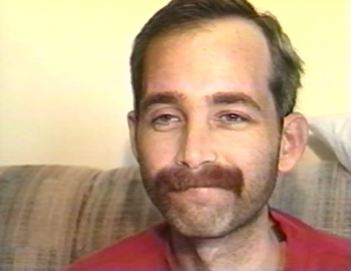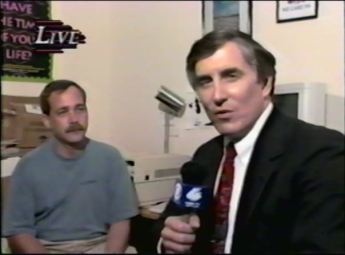
Robb smiles at me for the last time as we prepare for his final interview in early April 1996.
The last time I talked with Robb Dussliere was during the first week of April 1996, one year after we met at the AIDS Project office, where he and Beth Wehrman described the series they wanted to do about a man living with AIDS.
We had just found out that we had won Associated Press awards in both Iowa and Illinois for “Robb’s Life,” the episodes that ran during 1995. The series won First Place in both Iowa and Illinois. In Iowa, the award was for Documentary; in Illinois, it was for Continuing Series. The importance of this series was not lost on other journalists. For the Midwest, it was ground-breaking.
Robb got out of his death bed and walked very slowly to the couch. He appeared to be near the end, but when we started the interview, he looked up at me before my first question and mustered the best smile he could manage. That smile has burned in my memory for 20 years.
At the start of the interview, he said that his brother John had come into town for a visit, John’s last visit until summer.
“I might still be here this summer,” Robb said, but it was clear that was not the case. In fact, as I saw how little light was left in his eyes, how sluggish he appeared and how weak his voice was, I realized with a bit of alarm it was time to ask my final questions.
Robb described his brother’s visit as emotional, and said for the first time, he had gotten scared. He was feeling sensations in his body that he had not felt before, apparently the sensations of a body shutting down.
We had aired a tribute to his father, Lorney, and I was planning a similar tribute to Hattie, his mom. I asked him to talk about her, and he had beautiful things to say.
“I wouldn’t trade her for anybody else in the world,” he said. “She has always been there when I’ve needed her, and I know it will continue to be that way all the way up till the end.”
A couple of times during the interview, Robb lost track of what he was saying. He sat, his head down, admitting that he couldn’t think of the right word. This had never happened before.
Finally, I asked him how he wanted to be remembered. His answer will be in the final story that aired after his funeral on April 23rd.
At the end of the interview, the people who were in the house at the time left the room to give us a moment of privacy. I could feel my emotions welling up inside. I shut the camera off and looked him in the eyes.
After all the stories we had done together during the past 12 months, it was very difficult to believe that it was ending. All along, we knew that it would end with his death, but I had been in denial, partly through ignorance, and partly because I wanted him to survive. Now, we were both facing reality, and my heart felt as if I was losing someone very dear to me.
“Robb, I just want to thank you for everything,” I said as I began to cry.
It wasn’t very professional for a reporter to cry. Screw it, I thought. I don’t care.
He was remarkably calm. “Thank you, Ken,” he said.
“I’ve been struggling with the thought that your death could boost my career,” I said, referring to the awards.
Robb shook his head.
“Go for it,” he said. “I’m behind you 100 percent.”
I was barely able to get the next words out through the tears.
“I also want to tell you that I love you.”
“I love you, too,” he replied.
I don’t remember the rest of the conversation. He was tired and the interview had taken a toll. I gave Robb the warmest hug I could before packing up my gear.
“I’ll see you soon,” I said.
“Okay,” he replied.
It was the last time I saw him awake.

Robb and I did a live remote on WHBF-TV in July 1995, just three months after the beginning of the series.
In the years that have passed, Robb has been part of me. He trusted me. This blog, and my efforts to keep his legacy alive and raise funds for the DeLaCerda House, are my way of continuing to earn that trust. I am not a religious man. I don’t believe in life after death. But I am still alive, and while I am, I want to know that if Robb were aware of these efforts, he would smile and realize that his trust had been well-placed.
Robb’s story, for me, had been about more than just HIV and AIDS. I had only been aware of AIDS for 10 or 12 years. Homophobia had been part of my Kentucky-fried, stiff-wristed, macho-posturing heritage since the day I was born.
In the year that I had known Robb, he had taken me on a quiet journey of enlightenment. It is easy to fear and dislike people you don’t know. Education and understanding are powerful tools for sweeping away ignorance and prejudice.
I was not Robb’s first choice to do the series. WHBF-TV was not the first-place station in town. It was in dead last place. I am very happy that the first-place station turned him down. April 1995 to April 1996 had been quite a lesson for a Southern boy who had grown up referring to gay men as “queers” and “fags.”
When I first met Robb a year earlier, he was one of the first queers I had ever met who admitted it.
One year later, after observing his courage, his humor and his intelligence, after the countless hours I had laughed with him in person and while editing the features, after the tears I had shed in the editing booth and while watching the series at home, the truth of what had happened was clear as I said goodbye.
Robb Dussliere had become the first gay man I ever loved.